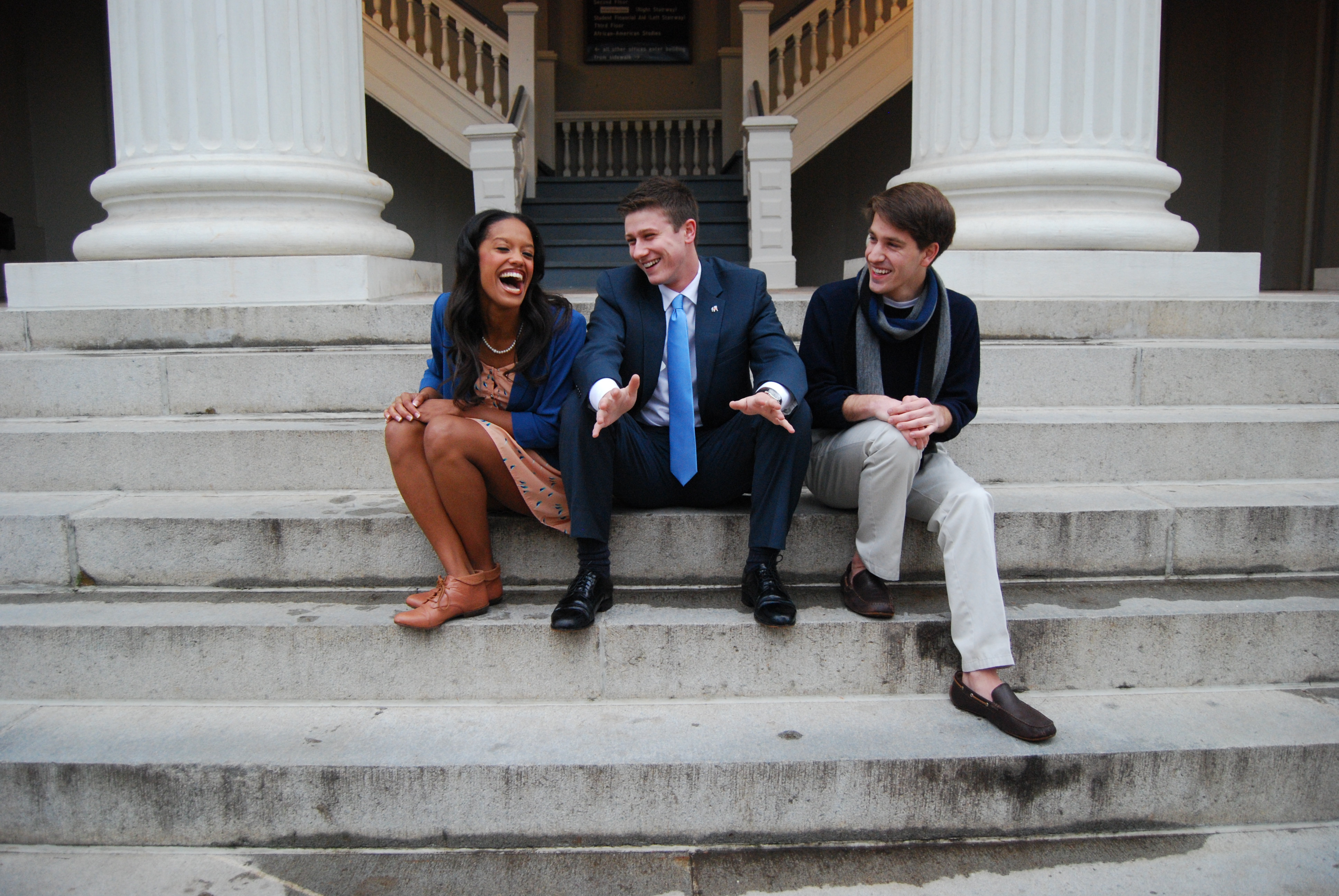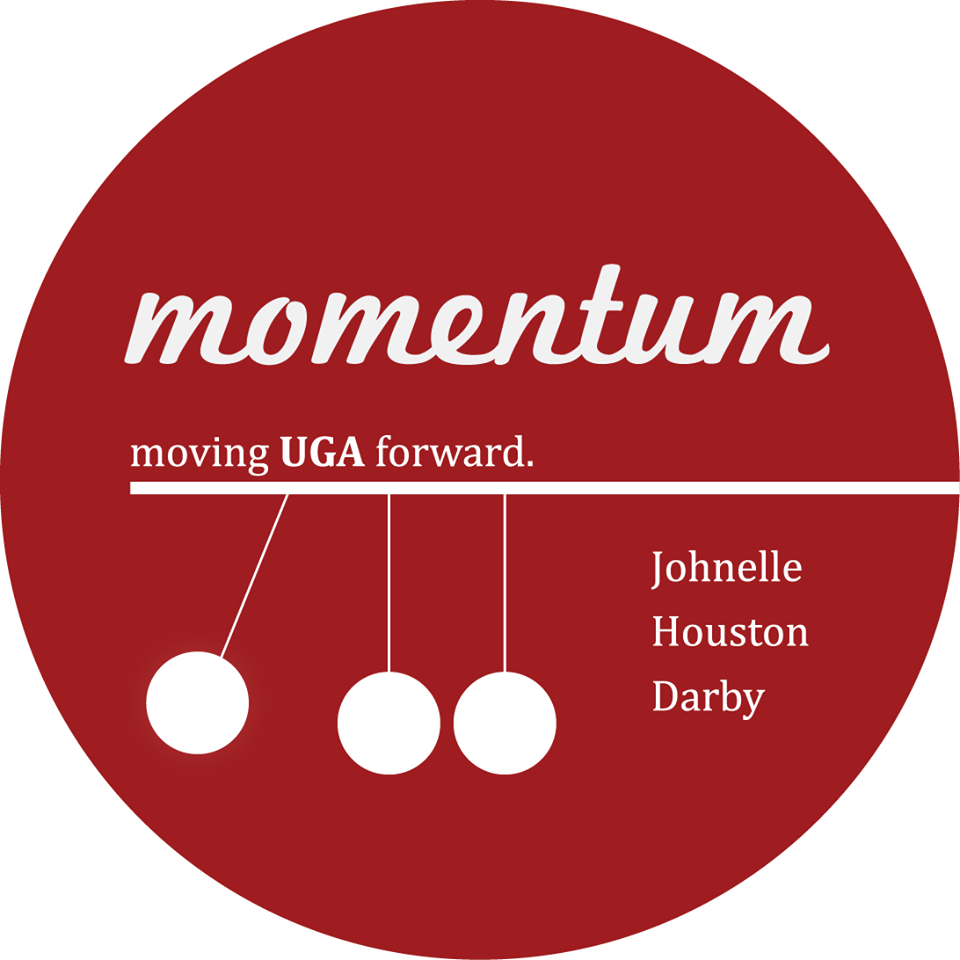 By: Quinn Rogness
By: Quinn Rogness
In part two of our interview with DJB, Drew, Jim, and Brittany speak about their student experiences, as well as their plans moving forward if elected as SGA Executives.
QR: Drew, You identify as a low-income student. What can SGA as well as the university do to better aid low-income students?
DJ: I definitely think the university does a lot. There’s not much I could do as SGA President to radically change things, but it comes down to what we could do in office to maintain those protections that are still there for low-income students. Every year, there is a discussion about potential changes to HOPE and how its reimbursement works. Without HOPE, I would literally not be able to attend the University of Georgia. HOPE, Pell grants, and student loans got me here, so I would do everything in my power to be that voice for students. Our platform has many things that are based off of my student experience, and one of those is study abroad scholarships. I was able to go to China, and that was literally a life-changing experience. I wouldn’t have been able to go without a $5,000 scholarship from SPIA which was given to need-based students. I’m not saying that if I were President, an enormous amount of money would miraculously get donated, but it would be my goal every day to make sure there are ways to find more money. I’ve spoken with President Morehead about doing something simple like going to the UGA Foundation as SGA President to give my story as a powerful testimony to help fight for more study abroad scholarships.
QR: Where did the inspiration for most of your platform proposals come from, and how much interaction did you do with normal students when crafting your platform?
DJ: We split our platform into three spheres. Our first sphere consists of reforming SGA. We’ve seen the organization’s strengths and weaknesses, and the next step is fixing the weaknesses in order to make SGA a legitimate name on campus. The second sphere was driven by our student experiences, personally, and that’s because we all have our own aspirations when moving into this office. We all joined SGA for a reason, and every year there are these so-called “pet projects”, so we picked things that are very close to us personally that still related to a number of students. For me it was graduate school testing, as well as study abroad programs. Our third sphere is “Your concern is our responsibility”, which is where we plan on sending out monthly emails allowing students to literally bash us, and tell us what we’re doing wrong so we can better do our jobs. We’re trying to take SGA away from being focused on individual projects, and reform it to create resources that students would like and let their opinion guide us the whole way. We have a large and diverse core staff from all parts of campus who literally told us what they liked and didn’t like about our platform. We have to wait until after the election to begin that Archnews push, but it’s going to be our main goal to have student-driven projects that are updated once monthly.
JT: In the past, platforms have often been crafted as political tools. For example, certain platform proposals would reach the Greek community, while others would target the green movement, but there isn’t personal connection to these platform ideas from the tickets. We can look to our platform and say, this is either Drew, Jim, or Brittany’s personal story that inspired this proposal. For me personally, I’m very passionate about educational equality, and believe in the power of education to transform and individual’s life. I remember over winter-break this past year, I saw a YouTube video of a young man who had just been accepted into ClemsonLife’s academic program, which says that learning is for everyone, and provides post-secondary educational opportunities to students with intellectual disabilities, and that’s something that made me wonder why we don’t have something like this at the University of Georgia. We’re the state’s flagship university, and have the obligation to serve every student in the state. I would use the duties of the position of vice president, which presides over the senate, to empower senators to reach out and encourage open dialogue, and to make sure senators are present at certain open forums to discuss sensitive issues on campus. Then, we can work with those leaders and create a more inclusive campus.
BA: The second part of our platform is student-experience based which makes us that much more passionate for us, and that drives us to make sure these ideas can be completed in the next few years of SGA. For me specifically, I’m passionate about preserving cultural diversity on campus and creating a more inclusive environment and I think my role of treasurer can do that in ways like reassessing the SGA budget. We’re allotted $2.21 per student next year, so taking money and reassessing line-items we don’t use or make the most of right now, we can use these funds to bring programs that make a more inclusive environment at UGA.
QR: One of your policy proposals is to create classes that teach graduate school test-prep. Could you explain more about this particular policy proposal?
DJ: The current prep classes are offered by the Georgia Center and they’re no less than $800 or $900 for three weeks. The average MCAT taker spends at least $1,000 preparing for the test. Students like me really don’t have that cash to fork out. We got this idea from UC-Riverside, which offers five week programs that meet two times per week, and go through practice tests and answer questions, much like a seminar class. These classes at UGA would meet two times a week, for an hour per week. These classes would be longer than current three week crash courses, meaning that students would be less stressed, and have more time to go through the material. Revamped classes would give students a regular group to meet with that fits into their schedule like an actual class period. They could be taught by grad students or professors. We’re open to all ideas.
QR: What makes DJB different from Bridge?
DJ: I think what makes us different from Bridge is how far we’ve come. Basically we formed this ticket in December, and we’ve been working for months to create a platform of which we are truly proud of, and truly passionate about, and as much as Bridge has done, they didn’t finalize their ticket positions until after the filing deadline. They truly have a good platform, but I think the difference is the amount of work and time we’ve actually taken to vet our entire process. They just simply haven’t had the same amount of time to do the same amount of work, and on top of that, I believe DJB just screams experience, because we’ve been through every single senate session, and we know what is currently going on. It is a tad of a hindrance not to have been present this past year.
JT: My first year, there was a ticket called “Redefine”, which was full of people who had never been a part of SGA before, and they were incredible. Looking back retrospectively, they were the best campaign that I’ve seen in the past three years. They started, and put in the research, so yes they weren’t in SGA at the time that they were running, but they were present at every senate meeting. The presidential candidate met frequently with Mallory Davis who was the president at the time, so they definitely put in the work. I can’t speak for everything Bridge has done behind the scenes, because I’m obviously not present for those conversations, but I would just hope that they have put in the same amount of work, because I think in order to move something forward, I see the need for a fresh perspective having seen Uzma’s (Uzma Chowdhury, current SGA vice president) work this year. But you also need that knowledge of previous experience to know where SGA has failed in the past, because a lot of initiatives that are brought up each year that are great ideas, but historical knowledge of SGA would show why some of these initiatives are not worth moving forward. Bridge has talked about working with UGA Dining Halls, but in the three years I’ve been with SGA, I know that’s a very difficult relationship to maneuver on campus, and so I would have to wonder how much they’ve actually talked to Dining Services on campus to see the feasibility of completely changing how food services is provided on campus. As to individuals, they are incredible, hard-working people, but I think their platform is very-tailored to student organizations, which doesn’t speak for all 35,000 students. They are three great candidates, and I commend them for the work they’ve done thus far.
What is the timeline for completing many of the tasks on your platform? What on your platform takes priority, and how do you manage student expectations as to what you can accomplish?
DJ: One of our biggest platform strengths is our 15-page implementation plan. We have clear goals, and we are going to go for those goals, but we understand that certain things like our Georgia educational equality plan will not get done in just a year. We also understand that it is the goal of SGA to ensure that these projects are seen through year after year. Even if it is just getting the ball rolling on some of these big projects, it’s our goal to do that and hope that next year’s executives would continue on with the work we’re doing. Our entire first sphere, SGA reform, is something we can do the day we get into office. This fall, we’re having a major constitutional convention where we can rework the constitution, and we are planning on doing that by tackling issues such as student-life seats, funding, and budgeting. We have a whole slew of ideas of how to fix the problems, and they’re going to come in the fall when we have that convention. One of SGA’s biggest problems is that members make these promises that they can never come through with, and we’re not sitting here making those promises. The promises that we are making are that we’ll work as hard as we can, and get as much done as possible, but at the very least, we will provide transparency to what we’re doing and why we’re doing it.


